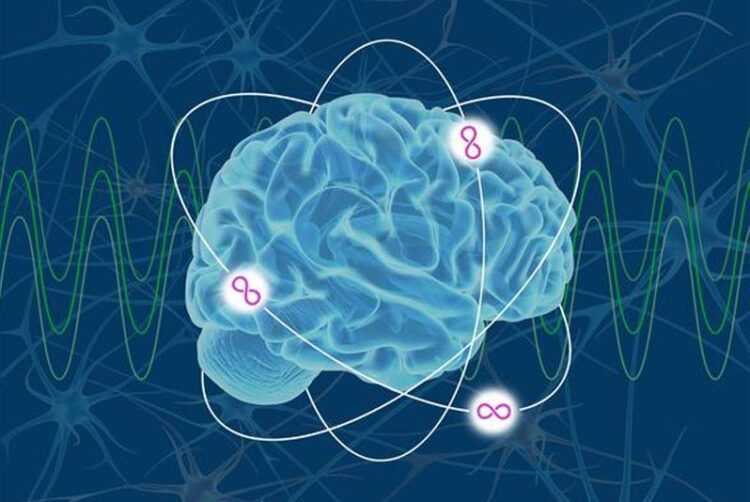Deficiency in certain brain proteins promotes compulsive behavior

Visualisation
(c) FMP, Claudia Knorr
Our behavior is controlled through neural circuits in the brain. Molecular disturbances can lead to stereotypical behavior, as seen in neuropsychiatric disorders like obsessive-compulsive and autism spectrum disorders.
A research team has now demonstrated that the absence of two proteins, Intersectin1 and Intersectin2, in mice leads to disrupted neural signaling and compulsive repetitive behavior, which is also observed in patients with Intersectin 1 mutations. This supports the idea that such defects can cause neuropsychiatric diseases. The study is published in “Proceedings of the National Academy of Sciences“.
Our brain is essentially our body’s computer. Through a complex interplay of various nerve cells in different areas, it controls and regulates all vital functions, such as breathing, how we move and speak, and how we respond to environmental stimuli with specific behavioral patterns. The so-called cortico-striatal circuit, which connects the cortex and striatum, two parts of the cerebrum, plays a key role in guiding goal-directed behavior.
“We already know that human behavioral disorders, in which a specific behavior is compulsively repeated, are associated with this circuit or network,” says Professor Dr. Tanja Maritzen, who studies nanophysiology at the University of Kaiserslautern-Landau (RPTU). However, much of what happens in this part of the brain at the molecular level remains a mystery to science.
In the current study, the team around Tanja Maritzen closely collaborated with the laboratory of Prof. Dr. Volker Haucke from Leibniz-Forschungsinstitut für Molekulare Pharmakologie (FMP), Charité Universitätsmedizin Berlin and Freie Universität Berlin. The researchers focused on two specific proteins that play a crucial role in this circuit. “Intersectin 1 and Intersectin 2 are large scaffold proteins that have many interaction sites,” says Professor Volker Haucke. “Previous research has shown that their mutation in humans correlates with behavioral abnormalities.”
To explore their exact role, the team inhibited the production of these proteins in mice. The results showed that the Intersectin proteins are vital for the organism, as some of the mice died early. A different subset displayed behavioral abnormalities: they stood on their hind legs in the corner and repeatedly jumped up and down. “Such symptoms, where a particular, essentially pointless behavior is compulsively repeated, are also known in neuropsychiatric diseases,” Professor Tanja Maritzen notes, citing autism spectrum disorders and obsessive-compulsive disorders as examples.
But what goes wrong at the molecular level? The team specifically looked at the NMDA receptor. “We observed that the absence of the two proteins results in fewer of these receptors at the ends of nerve cells, the synapses,” explains Professor Volker Haucke. This is crucial for the transmission of signals from one nerve cell to another. Neurotransmitters, chemical messengers, carry the excitation between cells by binding to receptors. “The Intersectin proteins, as scaffold proteins, are important to stabilize the NMDA receptor at the synapse,” he continues.
The deficiency of these proteins isn’t solely responsible for the onset of behavioral abnormalities. It is rather one component in a complex molecular system. The study has helped to understand a part of it better, reinforcing the notion that mutations in Intersectin can lead to neurological symptoms. Moreover, the study suggests that the NMDA receptor is a potential candidate for developing drug therapies for neuropsychiatric disorders.
Source:
Dennis Vollweiter, Jasmeet Kaur Shergill, Alexandra Hilse, Gaga Kochlamazashvili, Stefan Paul Koch, Susanne Muelle, Philipp Boehm-Sturm, Volker Haucke, Tanja Maritzen (2023) tin deficiency impairs cortico-striatal neurotransmission and causes obsessive-compulsive behaviors in mice. Proceedings of the National Academy of Sciences.
DOI: 10.1073/pnas.2304323120
Contact:
Professor Dr. Volker Haucke
Molekulare Physiologie und Zellbiologie
Leibniz Forschungsinstitut für Molekulare Pharmakologie (FMP)
E-Mail: haucke(at)fmp-berlin.de
Telefon: 030 94793 101
www.Leibniz-fmp.de/haucke
Professorin Dr. Tanja Maritzen
Nanophysiologie
RPTU in Kaiserslautern
E-Mail: maritzen(at)rptu.de
Telefon: 0631 205-4908
Originalpublikation:
DOI: 10.1073/pnas.2304323120
Media Contact
All latest news from the category: Life Sciences and Chemistry
Articles and reports from the Life Sciences and chemistry area deal with applied and basic research into modern biology, chemistry and human medicine.
Valuable information can be found on a range of life sciences fields including bacteriology, biochemistry, bionics, bioinformatics, biophysics, biotechnology, genetics, geobotany, human biology, marine biology, microbiology, molecular biology, cellular biology, zoology, bioinorganic chemistry, microchemistry and environmental chemistry.
Newest articles

Bringing bio-inspired robots to life
Nebraska researcher Eric Markvicka gets NSF CAREER Award to pursue manufacture of novel materials for soft robotics and stretchable electronics. Engineers are increasingly eager to develop robots that mimic the…

Bella moths use poison to attract mates
Scientists are closer to finding out how. Pyrrolizidine alkaloids are as bitter and toxic as they are hard to pronounce. They’re produced by several different types of plants and are…

AI tool creates ‘synthetic’ images of cells
…for enhanced microscopy analysis. Observing individual cells through microscopes can reveal a range of important cell biological phenomena that frequently play a role in human diseases, but the process of…





















